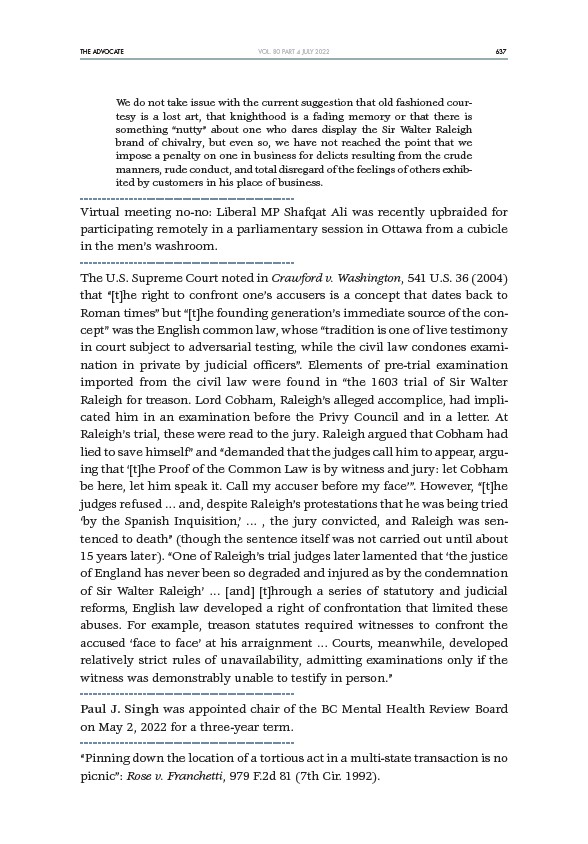
THE ADVOCATE 637
VOL. 80 PART 4 JULY 2022
We do not take issue with the current suggestion that old fashioned courtesy
is a lost art, that knighthood is a fading memory or that there is
something “nutty” about one who dares display the Sir Walter Raleigh
brand of chivalry, but even so, we have not reached the point that we
impose a penalty on one in business for delicts resulting from the crude
manners, rude conduct, and total disregard of the feelings of others exhibited
by customers in his place of business.
Virtual meeting no-no: Liberal MP Shafqat Ali was recently upbraided for
participating remotely in a parliamentary session in Ottawa from a cubicle
in the men’s washroom.
The U.S. Supreme Court noted in Crawford v. Washington, 541 U.S. 36 (2004)
that “the right to confront one’s accusers is a concept that dates back to
Roman times” but “the founding generation’s immediate source of the concept”
was the English common law, whose “tradition is one of live testimony
in court subject to adversarial testing, while the civil law condones examination
in private by judicial officers”. Elements of pre-trial examination
imported from the civil law were found in “the 1603 trial of Sir Walter
Raleigh for treason. Lord Cobham, Raleigh’s alleged accomplice, had implicated
him in an examination before the Privy Council and in a letter. At
Raleigh’s trial, these were read to the jury. Raleigh argued that Cobham had
lied to save himself” and “demanded that the judges call him to appear, arguing
that ‘the Proof of the Common Law is by witness and jury: let Cobham
be here, let him speak it. Call my accuser before my face’ ”. However, “the
judges refused … and, despite Raleigh’s protestations that he was being tried
‘by the Spanish Inquisition,’ … , the jury convicted, and Raleigh was sentenced
to death” (though the sentence itself was not carried out until about
15 years later). “One of Raleigh’s trial judges later lamented that ‘the justice
of England has never been so degraded and injured as by the condemnation
of Sir Walter Raleigh’ … and through a series of statutory and judicial
reforms, English law developed a right of confrontation that limited these
abuses. For example, treason statutes required witnesses to confront the
accused ‘face to face’ at his arraignment … Courts, meanwhile, developed
relatively strict rules of unavailability, admitting examinations only if the
witness was demonstrably unable to testify in person.”
Paul J. Singh was appointed chair of the BC Mental Health Review Board
on May 2, 2022 for a three-year term.
“Pinning down the location of a tortious act in a multi-state transaction is no
picnic”: Rose v. Franchetti, 979 F.2d 81 (7th Cir. 1992).